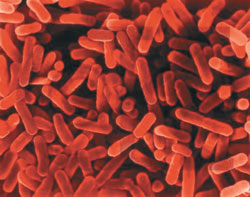Rowan Crowley, event director of H&V07 (NEC Birmingham, 27 Feb -
1 March 2007), updates hvac engineers on the current threat of legionella and points the way to where the latest information and advice on dealing with the issue can be found
DESPITE repeated advice from the Health & Safety Executive (HSE) and high profile cases like the outbreak in Barrow-in-Furness, cases of Legionnaires’ disease are surging in the UK.
Last month the Health Protection Agency (HPA) voiced concerns that in August there were 119 cases of the disease compared with 63 in August 2005. Although, there is a usual seasonal increase during August the figures are alarming.
It is difficult to determine whether the rise in cases is because of an increased awareness of the disease or a genuine increase in outbreaks but what it does indicate is a real but preventable problem.
Legionnaires’ disease is caused by inhaling small droplets of water suspended in the air which contain the legionella bacterium.

Legionella cells
Although, the bacterium is widespread in nature the main source of legionella cases in the UK is cooling towers, followed by hot and cold water services. This poses a real problem for hvac engineers trying to prevent outbreaks in their buildings since it only takes a short time for legionella to develop in stagnant water. Maintenance is key to preventing an outbreak.
In the case of Barrow-in-Furness poor maintenance led to the disaster at the Forum 28 centre which resulted in seven deaths and 172 serious injuries. Here design services manager, Gillian Beckingham was accused of failing to ensure the maintenance of the cooling towers and despite being found guilty of one charge of breaching the Health and Safety at Work Act, was cleared of corporate manslaughter. Although hvac engineers around the country may have been relieved that Ms Beckingham avoided a custodial sentence, it is not a time to relax.
Responsibility is core to legionella control. Steve Copping, a specialist inspector for the HSE, revealed at a recent conference that one of the major causes of legionella problems is the failure to appoint a responsible person to oversee water system risk and maintenance.
Another problem is that those deemed responsible for water systems may have been‘volunteered and often have little working knowledge of them.
It therefore makes sense for everybody involved in maintaining hvac systems to be aware of the risks and how to avoid legionella outbreaks. For this reason, the organiser of H&V07, the heating and ventilating industry’s premier biennial national event, have targeted legionella in their seminar programme. It is planned that a representative from the HSE will inform visitors on how to identify the risks of legionella and satisfy their legal duty.
The threat of legionella outbreaks also ties in with the theme of H&V07 which will be “Sustainable Solutions For The Future.” During the last few years there has been a marked swing to air cooled choices from cooling towers and evaporative condensers because of the health and safety issues. However, here lies a dichotomy since water cooled systems are recognised as energy efficient products. Therefore, one arm of government is encouraging the use of cooling towers and evaporative condensers for energy saving reasons while another arm is advising industry to avoid them for health reasons.
As fuel costs continue to soar and legislation tightens, legionella control is sure, then, to become an intrinsic part of the energy efficiency debate. Visitors attending H&V07 will be able to see how the industry is working very hard to meet these challenges through the development of innovative low-energy products, new techniques and more environmentally sustainable cooling approaches.